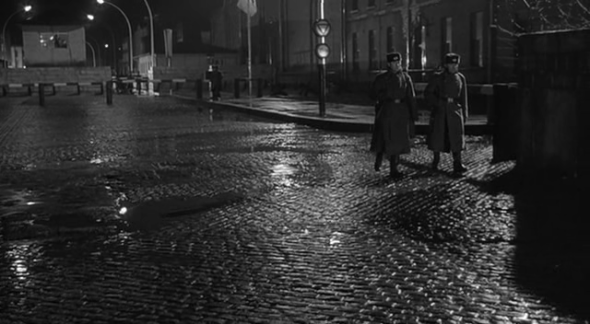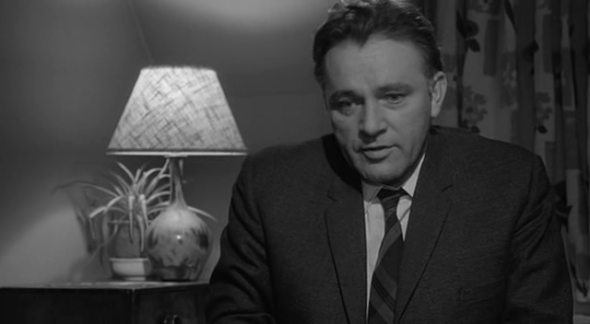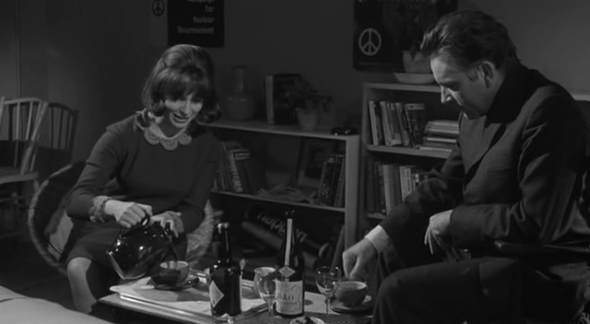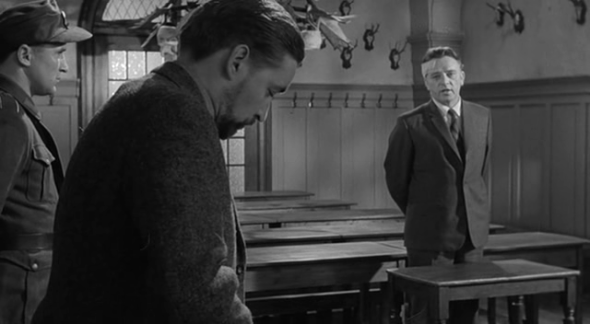Seduction and Ophuls’ Lola Montes
I mark every chapter of Max Ophuls‘ biopic of Lola Montes with the carnival routines. It’s probably not good to do so, since I conflate one part of the circus act with another. Some scenes, like the one involving horseback riding, even remind me of other carnival movies like the one with Charlton Heston.
It’s probably better to do this instead with what part of the heroine’s (Martine Carol) fascinating life that we’re seeing, like her mansion at the French Riviera or when she was Bavarian King’s (Anton Walbrook) courtesan. But there’s something less concrete about those episodes, as if they were a fantasy, because circumstances disallow permanence. Without the carnival the movie would be surprisingly boring, as if we’re watching her shuffling to different palaces. There’s beauty in those places but the circus’ surreal set pieces are to die for.
—
The movie’s transitions from wide-screen to lesser-wide screen seems more choreographed with repeat viewings. The ringmaster’s (Peter Ustinov) voice more commanding, the conversations between Lola and a German student (Oskar Werner) more intimate because the frame’s walls are closer. However, these black spaces also makes this feel like an incompletely restored movie. For a master, it feels like a gimmick to make these kinds of decisions or the refusal to make such a decision.
I want to know something deeper about the commonalities of Ophuls’ films, deeper than his opulent portrayal of the fragile status of the 19th century woman. Like fleeting glory that they can only touch but never hold. I envy women. Or maybe it’s the failed misogynist in the that does so, thinking that their ability to marry or consort into money isn’t self chatelling. I’m willfully confusing seduction with power. Social distinctions were more distinct back in Lola’s lifetime but she transcends her poor and suspiciously mysterious Irish provenance and be on stage for or to sit alongside Tsars and Grand Dukes and Kings.
But when students depose Kings they also get rid of her status. Her carnival life after Bavaria is as humiliating as, I imagine, it would have been for Cleopatra had she been found alive. A circus copyrights her life and she has to do it nightly for different towns. Thankfully she makes no pretenses, that she’s nothing but a performer. As a metaphor for her life, for the last act she climbs up different ladders and swings to the ceiling of the tent until she has to risk her life, taking a leap all the way down.
Related articles
- “Cinema’s 50 greatest flops, follies, and failures” (gointothestory.com)
The Spy Who Came In…
Adapted from the John le Carre novel of the same name, the first five minutes of Martin Ritt‘s The Spy Who Came in from the Cold will convince us that it’s not like any other ‘caper’ spy films, giving us melancholy piano and woodwind music hovering above the barbed Berlin Wall in the mid 60’s. Protagonist Alec Leamas (Richard Burton), an agent does a lot of waiting, needing coffee to stay up watching the border. The film lets us watch Alec and lets us into his head, only hearing his footsteps in the night. His conversations with soldiers aren’t racked up with tense music. In a few seconds, an Allied spy gets shot while trying to bike across the border. We see Alec for a half second as he watches his colleague die, but the film won’t let us see his eyes well up or glimmer in anger and vengeance.
Like any spy, Alec embarks on some method acting. Control pulls him away from Berlin back into London, is assigned to act like an alcoholic delinquent – I can hear some of you snarking that that’s not a stretch for Burton, but hold on. The goal is to make the Socialist agents in London think that he wants to defect, and he then plants false information that would implicate the higher powers of East Berlin to destroy each other. While working at a library that no one suspiciously visits, Alec meets a Communist woman named Nan Perry (Claire Bloom) and he grows fond of someone whose belief system is the target of his operation. I liked watching him challenge her. It shocked me to see an atheist character given a sympathetic, nuanced light in 1965, imagining that her character would be portrayed in a radically different way had this been a more American production.
The film also lets us into the more mundane parts of espionage life, letting us into tedious, unglamorous instructions by a head librarian which is subtly funny. Or detailed conversations between agents and double agents, Alec’s lies are a hazy prop compared to what’s really happening. He maneuvers his way within characters who refreshingly don’t look like movie stars.
I’m not sure if it’s the hair and make-up department who does the wonders here, but Oskar Werner, who plays Alec’s target Fiedler, has such a confident presence in the film compared to his wimpier turns in his collaborations with Francois Truffaut like Jules et Jim and Fahrenheit 451. he’s masculine yet subtle, commanding even for someone heading to a trap. Burton isn’t perfect in this movie. He can’t punch, and his last soliloquy in the end relies of his staccato delivery that might as well be his crutch. Other than that, this is his most subtle which makes it his career best in his movies that I’ve seen. It’s in his quietest moments when we can see him in his most vulnerable place, conveying the most emotion while just sitting there listening to another person. He deserves that Oscar nomination, showing us the human side of secret agents.








